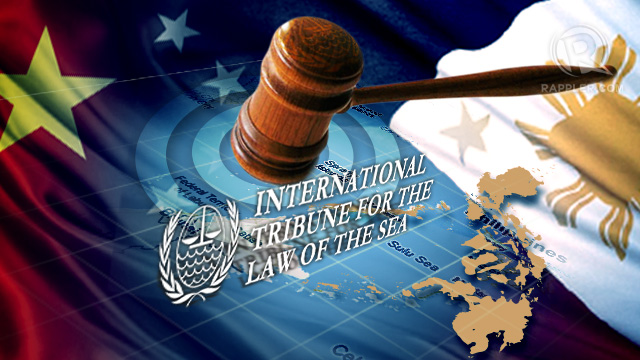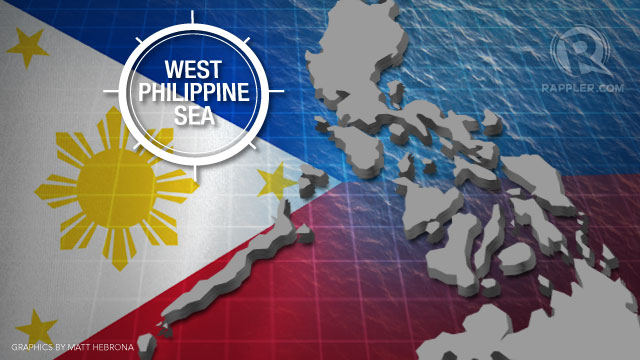SUMMARY
This is AI generated summarization, which may have errors. For context, always refer to the full article.

MANILA, Philippines (4th UPDATE) – The Philippine government announced on Tuesday, January 22, that it will elevate its territorial dispute with China to the International Tribunal for the Law of the Sea (ITLOS).
The Department of Foreign Affairs (DFA) said the government decided to bring the row in the West Philippine Sea (South China Sea) to Annex VII arbitration under the United Nations Convention on the Law of the Sea (UNCLOS).
The Philippines will ask the tribunal to declare China’s claims as “invalid” and that the said maritime areas should follow the UNCLOS, Foreign Affairs Secretary Albert del Rosario said in a press conference.
Chinese Ambassador Ma Keqing was summoned to the Department of Foreign Affairs (DFA) and given a note verbale regarding the Philippines’ Notification and State of Claim in the West Philippine Sea.
Del Rosario said that the Philippines asserts that China’s 9-Dash Line claim is against UNCLOS, of which both the Philippines and China are signatories, and thus “unlawful.”
“The Philippines has exhausted almost all political and diplomatic avenues for a peaceful negotiated settlement of its maritime dispute with China… We hope that the arbitral proceedings shall bring this dispute to a durable solution,” he told reporters.
Notification and Statement of Claim on the West Philippine Sea
China’s warships ‘useless’ in court
A source privy to the plan told Rappler that the National Security Council met earlier Tuesday to discuss the matter.
Solicitor General Francis Jardeleza was then called to join the meeting, prompting him to cancel his scheduled appearance at the oral arguments before the Supreme Court on the Cybercrime Law.
According to a senior official privy to the prolonged discussions that led to the decision, President Benigno Aquino III was initially reluctant to take this route because he feared the government would lose in the arbitration.
But China “would not stop occupying the Scarborough Shoal,” the official added.
The same source explained that ITLOS will first decide on whether islands or rocks constitute “maritime zones that can be subject to arbitration, despite China’s reservation.”
Reservation applies only to maritime boundary delimitation, not to status of islands or rocky outcrops such as Scarborough Shoal.
“If we win this issue, China [will be forced] to go to arbitration,” said the official, who spoke on condition of anonymity.
The only risk of this legal strategy, the official warned, is if the tribunal says it has no jurisdiction to decide the case because the status of islands is part of maritime delimitation.
If that happens, “we are back to square one.”
But if ITLOS does say it has jurisdiction over islands and rocks, the government official pointed out, then the validity of the 9-Dash line map will be against UNCLOS, so “we cannot lose on this issue.”

‘Solution still elusive’
Del Rosario stressed that the Philippines has tried numerous times to settle the dispute peacefully.
“On numerous occasions, dating back to 1995, the Philippines has been exchanging views with China to peacefully settle these disputes. To this day, a solution is still elusive,” her said.
“We hope that the arbitral proceedings shall bring this dispute to a durable solution.”
A briefing paper provided by the foreign department alleged that within the nine-dash line: “China has also laid claim to, occupied and built structures on certain submerged banks, reefs and low tide elevations that do not qualify as islands under UNCLOS, but are parts of the Philippine continental shelf, or the international seabed”.
Over the past two years the Philippines and Vietnam have complained at China’s increasing assertiveness in enforcing those claims, particularly around areas believed rich in oil and natural gas reserves.
Manila says the Chinese stance led to a standoff last year with the Philippines over rich fishing grounds around the Scarborough Shoal, a formation much closer to the Philippine coast than to China’s shores.

China says disputes should be settled by ‘concerned parties’
China swiftly dismissed the submission with Ambassador Ma Keqing repeating her country’s stance to an official in the Philippines foreign office.
“Ambassador Ma reiterated the principled position of the Chinese side, and stressed that China has indisputable sovereignty over the islands in (the) South China Sea and its adjacent waters,” a Chinese embassy statement said.
“The Chinese side strongly holds the disputes on (the) South China Sea should be settled by parties concerned through negotiations,” it added.
UNCLOS generally requires both parties to undergo arbitration and it was unclear if and when the UN would act given China’s stance.
However a source told AFP there were examples where cases had been heard with only one side present. – Rappler.com, with reports from Agence France-Presse
Add a comment
How does this make you feel?
There are no comments yet. Add your comment to start the conversation.